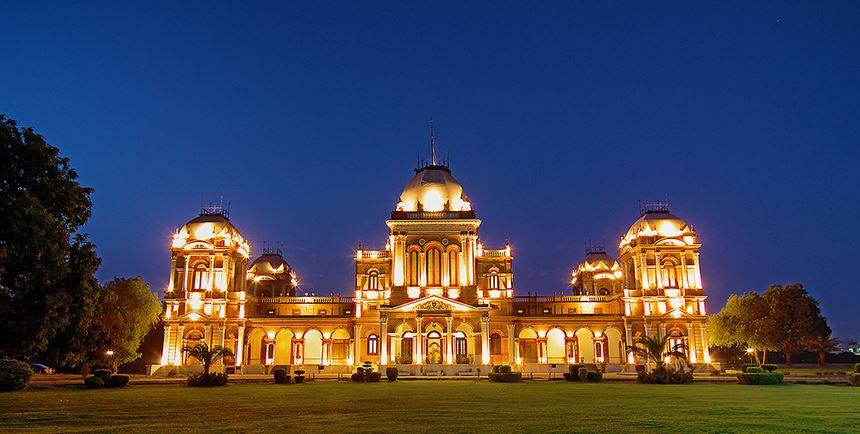Bahawalpur, often called the City of Nawabs, is one of the most historically and culturally rich cities in Pakistan. It is renowned for its royal heritage, architectural marvels, and vibrant traditions. Located in the Punjab province, Bahawalpur was once a princely state ruled by the Nawabs who contributed significantly to its development.

History of Bahawalpur
The Rise of the Princely State
Bahawalpur was established in 1748 by Nawab Bahawal Khan, the founder of the ruling Abbasi dynasty. The city thrived under the Nawabs, who aligned with the British Raj while maintaining autonomy. The state merged with Pakistan in 1955.
Contribution of the Nawabs
The Nawabs made significant contributions to the cultural, architectural, and administrative development of the regions they governed. They were great patrons of art, music, and literature, fostering a rich cultural heritage that blended Persian, Mughal, and local traditions. Many Nawabs commissioned grand palaces, mosques, and monuments that still stand today as symbols of their legacy. They also played a crucial role in governance, introducing administrative reforms, improving trade, and supporting agriculture. Despite their decline during colonial rule, their impact on society, culture, and governance remains an important part of history.
Geography and Climate
Location
Bahawalpur is located in Southern Punjab, bordering the Cholistan Desert. It is well-connected to major cities like Multan, Lahore, and Karachi via road and rail.
Climate
The city experiences an arid climate with extremely hot summers and mild winters. The best time to visit is from October to March, when the weather is pleasant.
Cultural and Architectural Heritage
Palaces and Forts
Bahawalpur is home to several historical palaces and forts that reflect the grandeur of the Nawabs.
|
Monument |
Significance |
|---|---|
|
Noor Mahal |
A stunning Italian-style palace built in 1872 |
|
Darbar Mahal |
A symbol of royal elegance with Indo-Islamic architecture |
|
Sadiq Garh Palace |
Once the residence of the Nawabs, known for its grandeur |
|
Derawar Fort |
A 9th-century fort with 40 towering bastions in the Cholistan Desert |
Mosques and Religious Sites
Bahawalpur also boasts magnificent religious structures.
-
Jamia Masjid Al Sadiq – One of the largest mosques in Pakistan, built by Nawab Sadiq Khan.
-
Bibi Jawindi Tomb – A UNESCO heritage site showcasing Islamic and Central Asian architecture.
Museums and Libraries
-
Bahawalpur Museum – Showcases artifacts from the Indus Valley Civilization and the Nawabi era.
-
Central Library Bahawalpur – One of Pakistan’s oldest libraries with rare manuscripts and books.
Economy and Industry
The economy and industry under the Nawabs were largely based on agriculture, trade, and handicrafts. They promoted industries such as textile weaving, metalwork, and pottery, which flourished under their patronage. Many Nawabs established trade links with other regions, encouraging the export of fine silk, muslin, and other luxury goods. Local markets thrived, and artisans received royal support, leading to the growth of skilled craftsmanship. Additionally, irrigation projects and land reforms helped boost agricultural productivity. However, with the rise of colonial rule, many traditional industries declined, affecting the economic prosperity that once flourished under the Nawabs.
Major Industries
-
Cotton and Textile – The city is a major cotton producer.
-
Handicrafts – Famous for camel skin products, embroidery, and pottery.
-
Agriculture – Produces wheat, sugarcane, mangoes, and dates.
Tourist Attractions
Desert Safari in Cholistan
The Cholistan Desert offers an exciting desert safari experience, with camel rides, jeep rallies, and camping under the stars.
Lal Suhanra National Park
A UNESCO biosphere reserve, home to wildlife such as deer, blackbucks, and migratory birds.
Abbasi Mosque
A striking white marble mosque near Derawar Fort, resembling the famous Badshahi Mosque.
Local Cuisine
Bahawalpur’s cuisine is a delightful blend of Mughal and Punjabi flavors.
-
Sohan Halwa – A famous dessert unique to Bahawalpur.
-
Cholistan Mutton Karahi – A spicy mutton dish cooked in traditional style.
-
Kebabs and Tandoori Roti – Popular among locals and tourists alike.

Education and Healthcare
The Nawabs made significant contributions to education and healthcare by promoting learning centers, madrasas, and libraries, which preserved and advanced knowledge in various fields such as science, literature, and philosophy. They encouraged scholars, poets, and teachers, fostering an environment of intellectual growth. Many Nawabs established institutions that provided education in Persian, Arabic, and local languages, ensuring the spread of knowledge among their subjects.
In healthcare, they supported the development of traditional medicine, including Unani and Ayurvedic systems, by setting up hospitals and dispensaries. Physicians were appointed to provide medical care to the people, and herbal gardens were cultivated for medicinal purposes. Their efforts laid the foundation for organized education and healthcare systems in their regions, leaving a lasting impact on society.
Notable Universities
-
The Islamia University of Bahawalpur (IUB)
-
Quaid-e-Azam Medical College
Healthcare Facilities
-
Bahawal Victoria Hospital (BVH) – One of the oldest and most advanced hospitals in the region.
Festivals and Events
The Nawabs played a key role in promoting and celebrating various festivals and events, fostering a spirit of unity and cultural vibrancy in their regions. They enthusiastically supported religious and cultural festivals, such as Eid, Muharram, Diwali, and Holi, allowing people of different communities to come together in celebration. Grand processions, feasts, and public gatherings were common during these occasions, with the Nawabs often hosting lavish ceremonies in their courts.
They also organized special events like literary gatherings, musical performances, and traditional sports competitions, encouraging artists, poets, and musicians to showcase their talents. These festivals and events not only strengthened social bonds but also enriched the cultural heritage of their era, leaving a legacy that continues to influence traditions today.
Bahawalpur Jeep Rally
The Cholistan Desert Jeep Rally is one of the most thrilling motorsport events in Pakistan, attracting racers from around the world.
Eid Celebrations
The city comes alive during Eid-ul-Fitr and Eid-ul-Adha, with grand feasts and celebrations.
Urs of Saints
Several shrines in Bahawalpur hold Urs (spiritual gatherings), drawing devotees from different regions.
Transportation and Connectivity
Road and Rail Network
Bahawalpur is well connected through:
-
National Highway (N5) – Links Bahawalpur to major cities.
-
Railway Station – Offers express train services to Lahore, Karachi, and Islamabad.
Bahawalpur Airport
The Bahawalpur International Airport provides domestic flights to major cities and occasional international flights.
Future Developments
Bahawalpur is witnessing rapid urban development, with new infrastructure projects, industrial zones, and educational institutions being established to enhance its economic growth.
Bahawalpur, the City of Nawabs, is a treasure trove of history, culture, and architectural wonders. From royal palaces and ancient forts to scenic landscapes and delicious cuisine, the city offers an unforgettable experience to visitors. Whether you're a history enthusiast, an adventure seeker, or a food lover, Bahawalpur has something special for everyone.





.gif)














Sign in
to continue to ilmkidunya.com